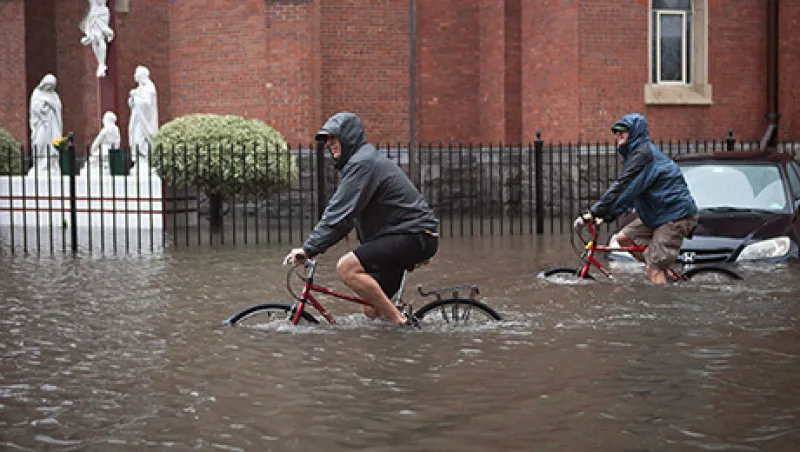A report published by the Risky Business Project, an initiative launched last October by Michael Bloomberg, Henry Paulson Jr. and Thomas Steyer, has estimated that the failure to take action to combat climate change could cost the U.S. economy tens of billions of dollars annually. The report, which was released today, also argues that it is not too late for the U.S. to prevent the devastating economic effects of climate change if government and business start acting now.
The report’s research team, co-led by climate scientist Robert Kopp of Rutgers University and economist Solomon Hsiang of the University of California, Berkeley, used independent data surrounding climate going out to the year 2100. According to their findings, within the next 15 years rising sea levels and storm surges will “likely increase the average annual cost of costal storms along the Eastern Seaboard and the Gulf of Mexico by $2 billion to $3.5 billion.” Factoring in potential increases in hurricane elevates that number to $7.3 billion a year, “bringing the total annual price tag for hurricanes and other coastal storms to $35 billion.”
The impact of changing weather patterns will have a dramatic impact on agriculture. Crop yields in the Midwest and South could decline by more than 10 percent a year over the next quarter century if farmers continue to grow corn, cotton, soy and wheat. Illinois and Missouri, for example, are likely to face a 15 percent fall in annual crop yields over that period and up to a 73 percent decline by 2100.
Rising temperatures, resulting from the higher concentration of green house gases in the atmosphere, will also increase energy consumption. To meet the increased demand, the U.S. will require as much as 95 gigawatts of new power generation capacity over the next 25 years. That’s the equivalent of 200 coal or natural gas–fired power plants, costing ratepayers as much as $12 billion a year.
“If there is anyone anywhere who remains asleep to the crushing costs of climate change, the statistics in this report will be the thunderclap that wakes them up,” says Robert Massie, the President of New Economy Commission, a Boston-based nonprofit established to promote a sustainable and equitable economy. Massie has also been an adviser to nonprofit 350.org, co-founded by the writer and activist Bill McKibben, which has been encouraging institutional investors — in particular university endowments — to divest from companies producing fossil fuel. “At this late point, a failure by a leader or trustee to respond to the massive risks the authors identify would be a tragic breach of duty, trust and intergenerational responsibility,” says Massie.
Advocates for taking action to prevent climate change span both sides of the political aisle. Bloomberg, founder of the financial data, technology and news company Bloomberg LP, was a Republican mayor of New York; Paulson, a former head of investment banking firm Goldman Sachs Group, was Treasury secretary under President George W. Bush; former hedge fund manager Steyer has been a contributor to the Democratic Party; and Robert Rubin, a former co-head of Goldman Sachs and an adviser to Risky Business, was Treasury secretary under President Bill Clinton.
“This is not just about values,” says Orin Kramer, president of New York–based hedge fund firm Boston Provident and a well-known Democratic fundraiser. “From a strictly economic perspective people need to pay attention to climate change.” The effects of changing weather systems are going to have very significant economic ramifications for local economies as well as agricultural production, explains Kramer, who worked in the White House during the Carter Administration. As the impacts of climate change cause mass migrations away from currently populated areas that become uninhabitable, he adds, climate change will also become “a Social Security problem.”
Rubin has called climate change “the existential issue of our age.” The steps necessary to adapt to the impact of a warming atmosphere will be costly. “Ongoing adaptive measures, such as the hardening and relocating of critical infrastructure, will be increasingly needed to cope with the effects of climate change,” Rubin says. “In addition, in my view, companies should disclose both their potential exposure to climate risk, and the potential costs they may someday be required to absorb to address carbon emissions.”
For more on climate change, see “Why Investors Should Care About Climate Change” and “The Ethics of Climate Change and the Divestiture Movement.”






